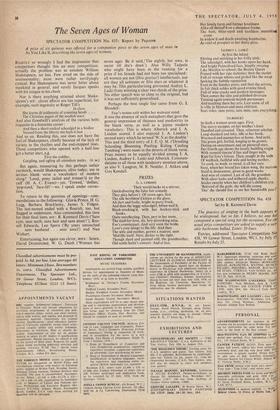The Seven Ages of Woman
SPECTATOR COMPETITION No. 435: Report by Papoose
A prize of six guineas was offered for a companion piece to the seven ages of man in As You Like It, describing the seven ages of woman.
RtGHTLY or wrongly I had the impression that competitors thought this an easy competition; actually the problem was to emulate William Shakespeare, no less. Few erred on the side of sentimentality; most were rather terrifyingly cynical. But Shakespeare was never bitter about mankind in general, and surely Jacques speaks with his tongue in his cheek.
Nor is there anything strained about Shake- speare's wit : clever effects are too superficial, for example, such ingenuity as Roger Till's
In class
She learns th'arithmetic of counting heads . . .
The Christian pagan of the modish mart. And also Goodwill's analysis of the various belts requisite in a feminine career :
And then a short-socked schoolgirl in a bodice , Named from the liberty she feels is lost . . . And so on. Reading this, one does not have the feel of Shakespeare, chiefly because of the lack of variety in the rhythm and the end-stopped lines. Those competitors who opened with a half-line got a better start, e.g.
First the toddler,
Gurgling, and ogling all attendant males. (P. m.) But again, measuring by this perhaps unfair yardstick, would Shakespeare, alive today, use in serious blank verse a vocabulary of modern slang? 'Loud, pony tailed and trouser'd to the• calf' (H. A. C. Evans)—yes. Trewed,"dollies,' `pop-eyed,"face-life—no. I speak under correc- tion.
To return to the question of openings—com- mendations to the following : Gloria Prince, H. G. Legg, Barbara Brocklesby, James S. Fidgen. The last-named ended with a flourish, too, but flagged in midstream. Also commended, this time for their final lines, are : R. Kennard Davis ('Sans eyes, sans teeth, sans hair and sans atout!'), Rus- sell Edwards, Leo Spero (13y years untouched . . . sans husband . . . sans souci') and Nan Wishart.
Entertaining, but again too clever, were : Senex, David Drummond, W. G. Daish (Woman has
seven ages. Be it said,/The eighth, her own, is secret till she's dead.'). Also Willy Tadpole who might have been in the running for a prize if his female had not been too specialised : all women are not (Deo gratias!) intellectuals, nor are they all actresses or film stars or whatever it may be. This particularising prevented Audrey L. Laski from winning a clear two-thirds of the prize. No other speech was so close to the original, but it was not sufficiently generalised.
Perhaps the best single line came from G. J. Blundell : Fear's mouse astir within her wainscot mind.
It was the absence of such metaphors that gave the general impression of thinness and mediocrity to the blank verse, as well as a jejune modern vocabulary. This is where Alberick and J. A. Lindon scored. I also enjoyed J. A. Lindon's second entry which he termed 'W. S. at the double.' This and the third entry of J. E. Q. M. ('Drooling Schooling Blooming Pooling Ruling Cooling Tombing') were oases in the deserts of blank verse. Prize money to be equally 'divided among J. A. Lindon, Audrey L. Laski and Alberick. Commen- dations to all those with laudatory mention above, as also V. Langton, M. E. Nodder, J. Aitken and Guy Kendall.
PRIZES
A. LINDON)
Their world backs to a mirror,
Quick silvering the false fair comedy They play before't. Of seven ages, first The silk-beribbon'd kitten at the glass, All dart and frolic, bright in party frock. And then the leggy schoolgirl, bitten-nail'd, Black-stocking'd, with her hockey-stick and books, Quite unreflecting. Then, pert in her teens, The mad-for-love, sly, boy-provoking miss, Eve's counterpart. And very soon the bride, Love's rosy image to the life. And then The wife and mother, grown a matron, seen 'Mid life itself. Next, darker to the sight, Though dyed and painted still, the grandmother.
Old senile habit's consort. And at last, Her lovely form and former loveliness Alike all shriverd on a shrunken frame, The bent, blear-eyed and toothless mumbli crone In widow'd and death-awaiting bombazine, As void of prospect as her dusty glass.
(AUDREY L. LASKI)
At first the infant
Flirting and smirking in her frilly pink; The schoolgirl, with her books upon her head, And bright Palmolived face, hippily swaying Like Marilyn to school; the Beauty Queen Primed with her ripe statistics; then the starlet Full of strange whims and girded like the wasp Seeking the bubble reputation
Even in the Sunday press; and then the actress, In fair thick sables with good ermine lined, Full of wise cracks and modern messages; Then comes the slim and polished divorcee Turning again towards boyish paramours And teaching them her arts. Last scene of all Is villa in Menton and mere oblivion.
Sans roles, sans press, sans men, sans everything.
(ALBERICK)
So hath a woman seven ages. First, The merry moppet, on her mother's knee Dandled and cosseted. Then, reluctant scholar, Long-shanked and inky, idle at her book, Wayward and mannerless at home. And next', The green girl, fretful, longing to be grown, Doting on sweetmeats and on pictured stars. Her fourth age shows the lovely budding virgin With vermeil-tinctur'd lips and finger nails, Ripe for love's foison. Then, caught in the toils Of wedlock, faithful wife and loving mother, To cook, to wash, to mend, is all her care. Next, when her brood has taken wing, the matron, Staid in demeanour, given to good works And wise of counsel. Last of all, the grandam With silver locks and withered apple cheeks, Smiles sweetly when her children's children cry. 'Beloved of the gods, she will die young Tho' she should live to see her hundredth year!'






















































 Previous page
Previous page